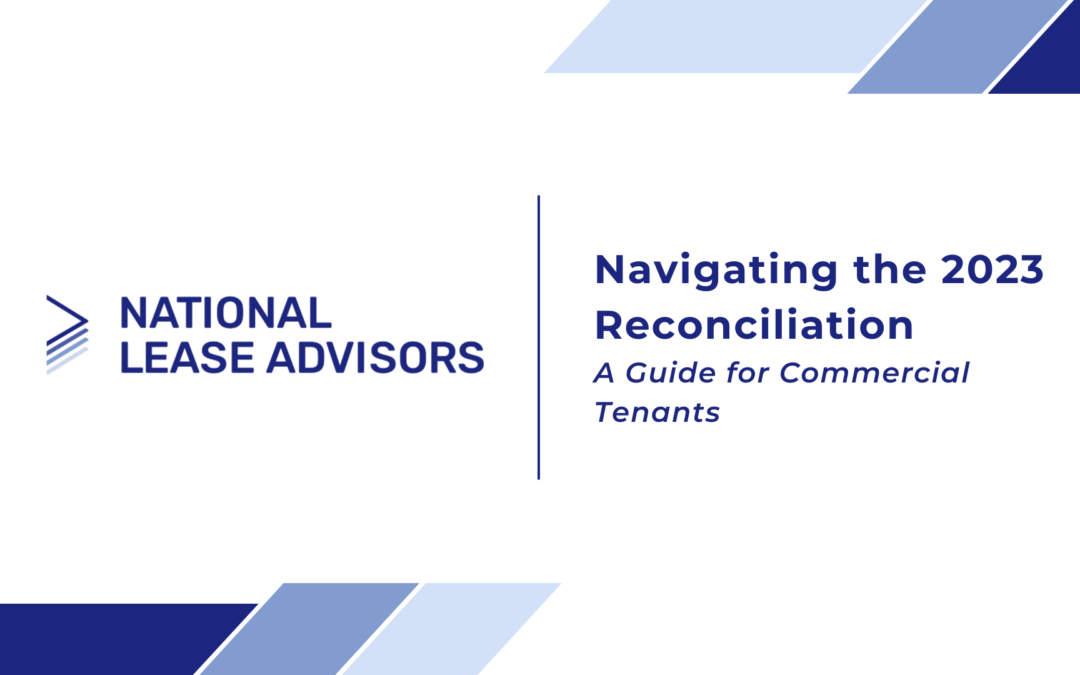As a commercial tenant, the start of a new year often brings with it the operating expense reconciliation statement for the previous year. The 2023 reconciliation is a critical document that reflects the actual expenses incurred by the landlord in operating and maintaining the property. Understanding and correctly handling this document is essential for ensuring you are being charged accurately and fairly.
National Lease Advisors reviews these statements on behalf of clients and routinely identifies errors and recoveries for tenants. In 2023, we identified over $2 million in erroneous charges by landlords.
What is a Reconciliation?
Unlike base rent, which is stipulated in the lease, building operating expenses are variable and depend on actual costs. A reconciliation is an accounting process where the actual operating expenses of a property are compared to the estimated expenses that were initially charged to the tenant. This process typically occurs annually. If the actual expenses were higher than estimated, the tenant will owe additional funds. Conversely, if the actual costs were lower, the tenant might be due a refund.
How Much Should Expenses Increase?
Building operating expense increases should be limited to the actual increase in costs to maintain the building. Inflationary pressure has increased expenses significantly relative to pre-Covid expenses. However, the bulk of this increase seems to be behind us as the December 2023 12-month CPI change came in at 3.4%. Property managers can no longer use inflation as an excuse to lose control of expenses. If year-over-year expenses increase by more than this, it may be time to start asking questions.
Steps to Take Upon Receiving Your 2023 Reconciliation
1. Review the Statement Thoroughly: When you receive the reconciliation statement, review it in detail. Check for the period it covers, the expenses listed, and how they compare to your lease agreement.
2. Verify Against Lease Terms: Cross-reference the expenses on the reconciliation statement with the terms of your lease. Ensure that the charges align with what is outlined in your lease agreement, particularly in areas like maintenance, utilities, capital expenses, and caps on increases.
3. Check for Accuracy and Consistency: Look for any discrepancies or unusual charges. Compare the current reconciliation with those of previous years to spot any significant variances that need explanation.
4. Consult with a Lease Administration and Audit Expert: If you have doubts or questions, consult with a lease administration and audit professional. They can provide clarity and guidance on whether the charges are justified and in line with market standards.
5. Request Detailed Backup Documentation: If certain charges are unclear, don’t hesitate to ask the landlord for detailed backup documentation. This can include invoices, receipts, and a breakdown of how each cost was calculated.
6. Negotiate Discrepancies: If you find discrepancies, discuss them with your landlord. Most times we find landlords are not being deceitful, but rather just made human error or didn’t properly interpret the lease. Open communication can lead to adjustments or compromises.
7. Prepare for Payment or Refund: If you owe additional funds, prepare to make the payment. If you’re due a refund, follow up with the landlord to ensure it’s processed promptly or applied to the open rent balance.
The annual reconciliation statement is a vital component of a lease and lease expenses. As a commercial tenant, taking the time to understand and properly manage your 2023 reconciliation can prevent financial surprises and ensure a fair and accurate accounting of property expenses. Always approach this process with diligence and, if necessary, seek professional advice to safeguard your business interests.
—
National Lease Advisors is a leader in the lease administration sector of the commercial real estate industry. The firm focuses on clients with multiple locations both regionally and globally and helps them manage their lease contracts, and provides lease accounting, transaction management, and audit services.

